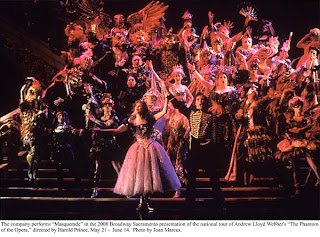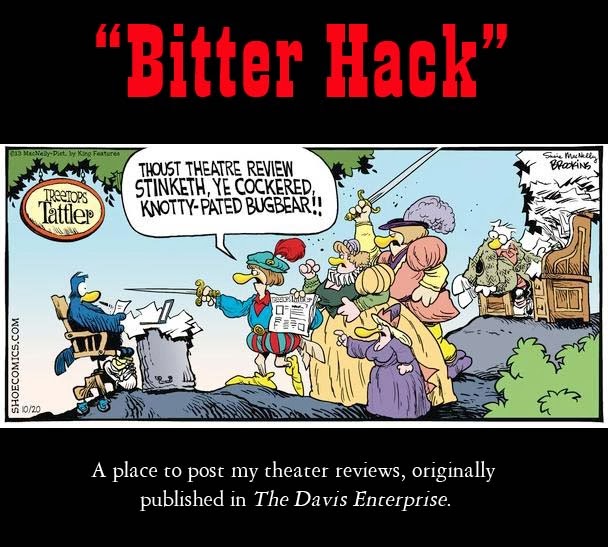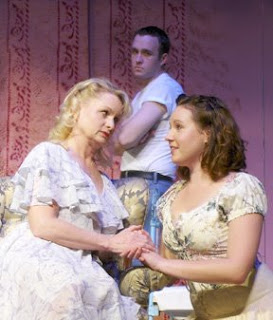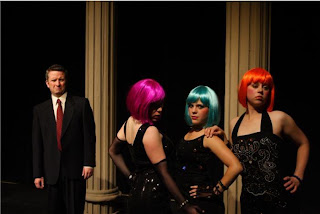
If there was any doubt that the award-winning Andrew Lloyd Webber musical, “The Phantom of the Opera” is a true "spectacle," the multi page "tour facts" handed out to reviewers is proof enough. (The replica of the Paris Opera chandelier weighs 1000 lbs, and contains 6,000 beads and 50 radio-controlled lights; there are 2,700 yards of fabric in the drapery, 141 candles rise out of the deck to form the underground lake, there are 230 costumes, and one life-sized elephant).
It may be stated that "Phantom of the Opera," directed by Harold Prince, is one of the world's most popular musicals. This is a show guaranteed to bring an audience to its feet at the curtain call, with cheers and wild applause, whether or not there is any substance to the script, whether or not the music is repetitive, whether or not the sound system allows you to understand the dialog, or whether the performances are top notch. There is so much gold and glitter and pizzazz that the spectacle alone is enough.
Sir Andrew Lloyd Webber's songs (with lyrics by Charles Hart and Richard Stilgoe), such as "Music of the Night" and "All I ask of You" have become some of the most recognized today.
With a stage show which has been around since 1986, following the original book by Gaston Leroux, and several movie versions, there are few who are not familiar with the story of the masked disfigured musician who lurks beneath the catacombs of the Paris Opera House. He is in love with Christine Daaé, an aspiring young soprano, and sets about making her a star by terrorizing the owners and members of the resident theater company.
Stephen Tewksbury as the Phantom is an imposing figure, but a bit too melodramatic (though how else can you be when your role requires you to holler from all corners of the stage, climb up into the procenium, and sing from within a gilded set of angels?).
Sara Jean Ford as Christine is marvelous. She gives the role the proper degree of innocence and naivete and she has a show stopper with her, "Wishing you were somehow here again," which she sings at her father's grave. (Ford will be replaced by Marni Raab on June 1 and Kelly Jeanne Grant will also play the role at selected performances)
Greg Mills as Raoul, Vicomte de Chagny, Christine's other suitor, is more convincing as the lovestruck youth and he has an excellent voice.
In smaller roles, Bruce Winant (Monsieur Firmin) and D.C. Anderson (reprising his role as Monsieur André), provide comic relief as the new owners of the Paris Opera, who discover they have purchased not only a theater company, but its phantom as well.
Nancy Hess, as the ballet mistress Madame Giry, the only one who actually seems to know the Phantom, gives a solid performance.
Kim Stengel handles the role of opera diva Carlotta Giudicelli well, with a firey temperament and a strong voice.
John Whitney plays the rotund tenor, Ubaldo Piangi, as a stereotypical buffoon.
There are wonderful visuals in this production, thanks to the production design of Maria Björnson. The rehearsal of the opera Hannibal is sheer opulence, and shows the marvelous choreography by Gillian Lynne. (The elephant is the star of this scene!) Lighting designer Andrew Bridge also gets applause for his realistic depiction of true "footlights" for the stage.
One of the most famous scenes, the Phantom piloting a gondola through the "lake" in the basement of the Opera House, is every bit as impressive as when I first saw this show in London, with fog rising off the water, and those 141 candles to light the way, as the boat glides across the stage as if on a real lake.
"The Phantom of the Opera" is a lush, beautifully directed musical with familiar melodies and strong performances. No one attending this production will come away disappointed.


